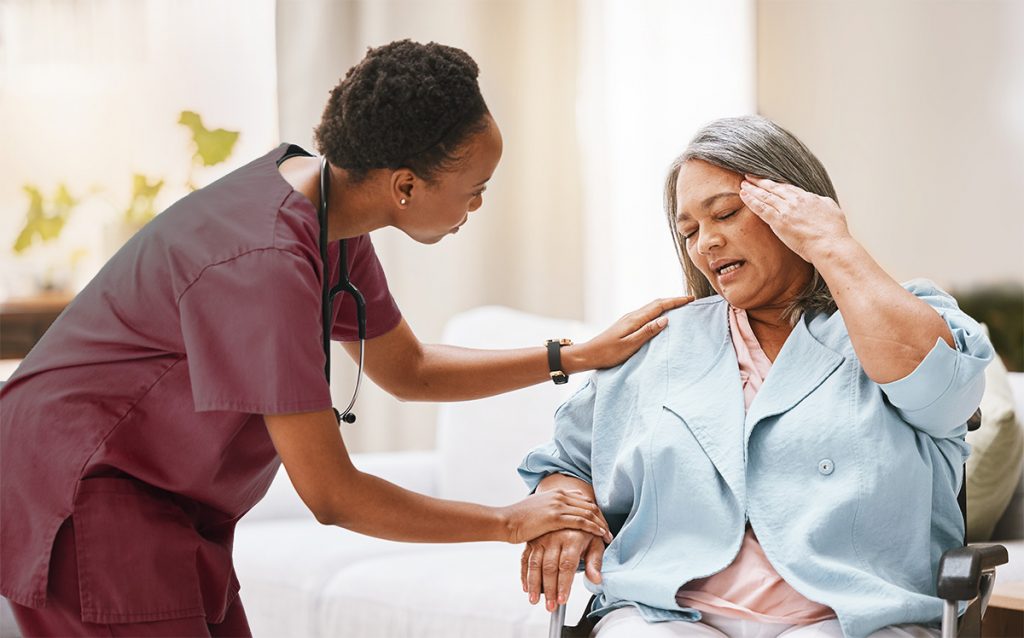Cognitive Health
Cognitive health is the ability to think, learn and remember clearly. Good cognitive health is needed so that you can effectively carry out your many everyday activities. Good cognition is just one aspect of overall brain health.
Is your brain healthy? What is brain health?
Your brain functions in several areas: cognition, motor function, emotional function, tactile function and sensory function. Your brain’s health can be affected by age-related changes such as stroke, traumatic brain injury, mood disorders like depression, substance use disorder or addiction. Diseases such as Alzheimer’s and other dementias also affect brain health.
What Can I Do?
What can I do to maintain, and improve my cognitive health? The first thing is to take care of your physical health. You should keep your doctor appointments and meet with your doctor on at least an annual basis. When you meet with your doctor, you can discuss
- Chronic health issues like diabetes, depression and cholesterol
- Medicines, supplements and vitamins and which ones can affect your brain
- Use of alcohol, caffeine, nicotine, including the use of chewing tobacco
- Dietary choices with a focus on foods that are high in nutrition, vitamins and fiber.
- Your ability to get the kind of exercise you need to manage your weight and build strength and flexibility
- Sleep hygiene and hearing or vision concerns.
Manage Your Blood Pressure
Having high blood pressure especially in mid-life has been shown to lead to cognitive decline in later years. People age 50 and older who lowered their systolic blood pressure to less than 120 mmHg over 5 years, reduced their risk of developing mild cognitive impairment which can lead to dementia.
Eat Healthy
It has been said that, “You are what you eat” and this is so true. Eat nutritious foods including fruits and vegetables, lean meats, fish, poultry and dairy products. Limit fats, sugars and salts. Control your portion size. Drink plenty of water.
Be Physically Active
Exercise improves strength and balance, and cognition. It improves your energy levels, mood and reduces depression. Try to get 150 minutes of physical activity each week. Start by walking. Or, join exercise programs with others designed to prevent falls.
Beyond Socialization
Research has found that older adults who learn a new, more cognitively-demanding skill, like quilting or digital photography, had more memory improvement over those who simply engage in more socialization. More research is needed, however.
When Do I Need Home Healthcare?
In-home care is usually prescribed for people who have had an injury or illness that results in a hospital stay, or a stay in a rehab facility. In-home care makes the transition home easier after discharge. It’s a way for your doctor to stay informed of your progress once you return home.
But in-home care is also prescribed in other circumstances. Suppose you had a fall in your apartment.
Suppose you became ill with a new diagnosis. Suppose you suffer a severe bout of the flu or dehydration. Or maybe you’re not feeling quite right because of a new medication. Something as simple as general decline in one’s health and ability to be independent can also trigger the need for home health.
If you are wondering whether a home health visit would help you, just call (314) 330-7992. A care consultant will speak with you about your concerns.
How do I know that I need home healthcare services?
- Decline in balance
- Decline in transfer or ambulation ability
- Difficulty getting up out of a chair
- New wound or sore that isn’t healing
- New catheter placement
- Recent UTI
- New medications or recent change in medications
- Increased and/or new confusion
- Recent hospitalization
- Recent Urgent Care visit
- Recent Surgical Procedure (even if outpatient)
- High or Low Blood Pressure
- High or Low Blood Sugars
- Any type of orthopedic condition
There is no need for qualifying hospital or SNF stay to receive home healthcare. We can help you understand your insurance benefits.
Call us (314) 330-7992
November Is Caregiver Appreciation Month
You’re An Angel
Caregiving is not ever easy. No matter whether you are a family member providing care, or a professional caregiver on assignment from an agency, your work is essential to the health and quality of life of your client. Caregiving requires sacrifices and adjustments for everyone, there’s a lot of juggling work and family life but it is rewarding.
Because of the ongoing demands of caring for someone, it can be easy to overlook your own personal needs. Are you feeling exhausted, overwhelmed or anxious? Having trouble sleeping? Experiencing headaches, pain or other physical problems? Do you find that you do not have enough time to exercise, eat healthy. Are you skipping showers or other personal care like brushing your teeth. Are you misusing alcohol or prescription drugs?
- To get exercise, walk the dog, get the mail or go outside for a break. Take stretch breaks.
- Eat well and get plenty of water.
- Strive for seven to nine hours of sleep
- Download a smartphone app for guided meditation or relaxing music and use it. Journal your feelings on paper or with a friend.
- Take time to do something you like. Watch a movie, engage in a hobby or call a friend or neighbor
- Keep up with your health. If you do not feel well, don’t ignore it. Call your doctor.
- Above all, be kind to yourself. You do not have to be cheerful all the time. Feelings of sadness, frustration and guilt are normal.
If you are a family member caring for a loved one, you may need to ask others in your family for help. This is not always easy. Try asking for small things first by text or email, if a phone call is too hard. List the tasks you need help with and practice asking others for help. Be honest about what you need. Not everyone is able to help in the way that is needed. Be prepared to say, “no thank you,” and do not take it personally. There are resources in your community that may be able to help like non-profits, churches, senior centers or your faith community. There are also on-line caregiver support groups. People in these groups know what you are going through and can offer suggestions.
Friends and Families
We want to express our sincere appreciation for your business, your confidence and your loyalty. We are deeply thankful and extend to you our best wishes for a happy and healthy Thanksgiving Day.









Comments are closed.